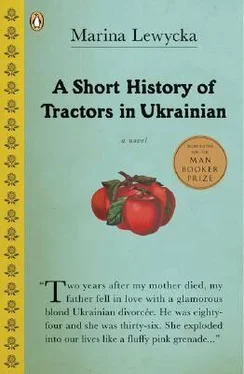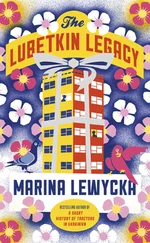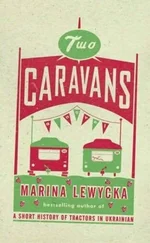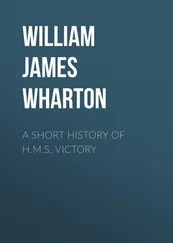“Oh, Valentina, it’s beautiful! He…she…is it a boy or a girl?”
“Is a girl.”
And now I notice that the baby’s coverlet is embroidered with small pink roses, and the sleeves of her little jacket are powder-pink.
“She’s beautiful!”
“I think so.” Valentina beams proudly, as though the baby’s beauty is her personal achievement.
“Have you got a name for her yet?”
“Name is Margaritka. Is name of my friend Margaritka Zadchuk.”
“Oh, lovely.” (Poor child!)
She points to a pile of lacy pink baby clothes on a chair at the side of the cot, knitted with great skill out of soft polyester yarn.
“She make it.”
“Gorgeous!”
“And is name of most famous English President.”
“I’m sorry?”
“Mrs Tatsher.”
“Ah.”
The baby stirs, opens her eyes, sees us standing looking down into her cot, and her face puckers, poised between crying and smiling. “Guh guh,” she says, and a trickle of whitish fluid runs from the corner of her mouth. “Guh guh.” Then little dimples appear in her cheeks.
“Ah!”
She is beautiful. She will make her own life. Nothing that has happened before is her fault.
Father must have heard me arrive, for now he comes in beaming.
“Good you can come, Nadia.”
We hug.
“You’re looking good, Pappa,” It’s true. He’s put a bit of weight on, and he is wearing a clean shirt. “Mike sends his love. He’s sorry he couldn’t come.”
Valentina ignored him when he came in, and now she leaves the room, turning on her high-heeled slippers without a word. I pull the door dosed, and whisper to Pappa.
“What do you think of the baby then?”
“Is girl,” he whispers back.
“I know. Isn’t she lovely? Have you found out who the father is?”
Pappa winks and pulls a mischievous face.
“Not me. Ha ha ha.”
From one of the upstairs rooms comes the rhythmic thud-kerboom-thud of heavy metal music. Stanislav’s musical tastes have obviously matured from Boyzone. Father catches my eye and puts his hands over his ears with a grimace.
“Degenerate music.”
“Do you remember, Pappa, how you wouldn’t let me listen to jazz when I was a teenager? You said it was degenerate.”
I have a sudden recollection of him storming down into the cellar and turning the electricity off at the mains. How my cool adolescent friends sniggered!
“Aha,” he nods. “Probably it was so.”
No jazz. No make-up. No boyfriends. No wonder I started to rebel as soon as I could.
“You were a terrible father, Pappa. A tyrant.”
He clears his throat. “Sometimes tyranny is preferable to anarchy.”
“Why have either? Why not have negotiation and democracy?” Suddenly this conversation has become too serious. “Shall I ask Stanislav to turn it down?”
“No no. Never mind. Tomorrow they going.”
“Really? Going tomorrow? Where are they going?”
“Back to Ukraina. Dubov is building roof-rack.”
In the front garden, there is a sudden roar of a car engine. It is the Rolls-Royce springing into life. We go over to the window to watch. There is the Rolls-Royce, throbbing away, and it has indeed been fitted with a sturdy home-made roof-rack across its whole length. Dubov has the bonnet up and is doing something to the engine to make it run alternately fast and slow.
“Fine tuning,” Father explains.
“But will the Rolls-Royce make it to Ukraina?”
“Of course. Why not?”
Dubov looks up, sees us at the window, and waves. We wave back.
That evening six of us sit down to dinner around the table in the bedroom-dining-room: Father, Dubov, Valentina, Stanislav, Margaritka, and I.
Valentina has rustled up five portions of boil-in-the-bag beef slices with onion gravy, which she serves with frozen peas and oven chips. She has changed out of her dressing-gown, but is wearing the same high-heeled fluffy slippers, with elasticated trousers that have loops under the heels to stretch them tight over her bottom (wait till I tell Vera!), and a tight-fitting, pastel-blue polo-neck. She is in high spirits, and smiles at all of us except Father, whose beef slices are slapped down in front of him with a little more force than is strictly necessary.
Father sits in the comer, fussily cutting everything up into little pieces and examining it closely before putting it in his mouth. The skins of the peas irritate his throat, and he starts to cough. Stanislav is next to him, eating silently with his head bowed low over the plate. I feel sorry for him after his humiliation in court, and try to open up a conversation, but he gives one-syllable answers and avoids my eyes. Lady Di and his girlfriend have, in the short space of their former mistress’s visit, unlearned all their careful training, and are prowling around the table yowling for tit-bits. Everyone obliges, especially Father, who gives them most of his dinner.
Dubov is sitting at the other end of the table, carefully cradling the tiny baby in his arms, feeding her milk from a bottle. Valen-tina’s superior breasts are evidently for display purposes only.
After supper I wash up, while Valentina and Stanislav go upstairs to continue with their packing. Father and Dubov retire into the front room, and after a few minutes I join them. I find them poring over some papers on which they are drawing something technical-a car beside a vertical post and some straight lines connecting them. They put aside the papers and Father takes out the manuscript of his master work, and settles himself into the armchair with his parcel-taped reading glasses on his nose. Dubov sits opposite him on the settee, still cradling the sleeping baby in his arms. He makes way for me to sit next to him.
Every technology which is of benefit to the human race must be used appropriately and with respect. In no instance is this more true than in the case of the tractor .
He is reading easily, in Ukrainian, pausing from time to time for dramatic effect, his left hand poised in the air like a conductor’s baton.
For the tractor, despite its early promise to free mankind from grinding toil, has also brought us to the brink of ruin, through carelessness and over-use. This has happened throughout its history, but the most striking example is in America in the 1920s .
I have said that it was the tractor which opened up the great prairies of the West. But those who followed the early pioneers were not satisfied with this. They believed that if use of tractors made the land productive, greater use of tractors would make the land more productive. Tragically it was not so.
The tractor must always be used as an aid to nature, not as a driver of nature. The tractor must work in harmony with the climate, and the fertility of the land, and the humble spirit of the farmers. Otherwise it will bring disaster, and this is what happened in the Midwest .
The new farmers of the West, they did not study the climate. True, they complained of the lack of rain, and the strong winds, but they did not heed the warning. They ploughed and they ploughed, for more ploughing, they believed, would bring more profit. Then winds came and blew away all the earth that had been ploughed .
The Dust Bowl of the 1920 s , and the extreme hardship which stemmed from it, led ultimately to the economic chaos which culminated in the collapse of the American Stock Exchange in 1929 .
But it could be added, further, thatthe instability and impoverishment which spread throughout the world were also factors behind the rise of Fascism in Germany and Communism in Russia, the clash of which two ideologies almost brought the human race to its doom .
Читать дальше












